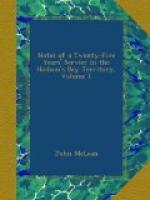These reforms effected, would the people of England be permanently benefited by them? Supposing the whole arable soil of England were divided in equal portions among its crowded inhabitants, (passing by the injustice of robbing the present proprietors of their lawful possessions—many of them acquired by the same hard labour or skill by which an artisan gains his weekly wages,) would the equality of property long continue? Would not the sloth, improvidence, and imprudence, that ever distinguish a great proportion of mankind; and the industry, foresight, and ambition that characterise others, soon bring many of the equal lots into one, thus forming a great estate, the property of an individual,—when matters would just be at the point where his reverence found them? And then, of course, would follow another “equitable adjustment,” to relieve the wants of the poor, whose progenitors had squandered their patrimony. Or, admitting that the lots remained in possession of the families to whom they were originally granted, would the produce be equal to the maintenance of their numerous descendants, when the property became divided and subdivided into fifty or a hundred shares?
The present proprietors of the soil of England have, undoubtedly, large incomes; but what becomes of those incomes? Do they not flow back into the hands of the merchants, tradesmen, servants, &c.?—the greater proportion, at least; for the sums expended by our tourists on the continent form so inconsiderable a portion of those incomes, as not to be worth mentioning. The same may be said of the alleged wealth of the clergy; for (admitting the allegation) it all flows back into the channels whence it issued; and, although neither belonging to the Church of England, nor approving of her forms of government, I do not think that her downfall would improve the temporal condition of the people. If we wish to remain a Christian nation, we cannot dispense with the services of the clergy; and in order that those services may be efficient, they must be maintained in independence and respectability.
As to a republican form of government, that experiment has been already tried in England, and failed; it may be tried again with no better success. The circumstances in which the American people found themselves after the Revolution, rendered the adoption of republican institutions both safe and beneficial. They had learned by experience that the remote position of their country secured their independence from the ambitious projects of any power in Europe; while they had nothing to fear from any power in America. Thus situated, any form of government, consistent with the due maintenance of good order at home, answered their purpose. The nascent republic might, at the period in question, have adopted as its motto, “Liberty and Equality,” with the utmost propriety; for all enjoyed equal liberty, and nearly equal fortunes. Experience, however, shows that liberty and equality cannot long exist under any form of government; industry procures wealth, wealth induces ambition, and ambition sighs after distinction and power.




